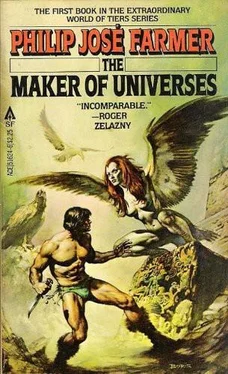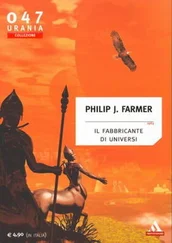So it went in Wolff’s mind that long afternoon as they rode. But dinner and drink and good fellowship dispelled them so that, at bedtime, he had forgotten his doubts. The three had stopped at a tavern in the village of Gnazelschist and eaten heartily. Wolff and Kickaha devoured a roast suckling pig between them. Funem Laksfalk, although he shaved and had other liberal views of his religion, refused the taboo pork. He ate beef—although he knew it had not been slaughtered a la kosher. All three downed many steins of the excellent local dark beer, and during the drink-conversation Wolff told funem Laksfalk a somewhat edited story about their search for Chryseis—a noble quest indeed, they agreed, and then they all staggered off to bed.
In the morning, they took a shortcut through the hills which would save them three days’s time—if they got through. The road was rarely traveled, and with good reason, for outlaws and dragons frequented the area. They made good speed, saw no men-of-the-woods and only one dragon. The scaly monster scrambled up from a ditch a hundred yards ahead of them. It snorted and disappeared into the trees on the other side of the road, as eager as they to avoid a fight.
Coming down out of the hills to the main highway, Wolff said, “A ravens following us.”
“Yeah, I know it, but don’t get your neck hot. They’re all over the place. I doubt that it knows who we are. I sincerely hope it doesn’t.”
At noon of the following day, they entered the territory of the Komtur of Tregyln. More than twenty-four hours later, they arrived within sight of the castle of Tregyln, the Baron von Elgers’ seat of power. This was the largest castle Wolff had so far seen. It was built of black stone and was situated on top of a high hill a mile from the town of Tregyln.
In full armor, pennoned lances held upright, the three rode boldly to the moat that surrounded the castle. A warder came out of a small blockhouse by the moat and politely inquired of them their business.
“Take word to the noble lord that three knights of good fame would be his guests,” Kickaha said. “The Barons von Horstmann and von Wolfram and the far-famed Yidshe baron, funem Laksfalk. We look for a noble to hire us for fighting or to send us on a quest.”
The sergeant shouted at a corporal, who ran off across the drawbridge. A few minutes afterwards, one of von Elgers’ sons, a youth splendidly dressed, rode out to welcome them. Inside the huge courtyard, Wolff saw something that disturbed him. Several Khamshem and Sholkin were lounging around or playing dice.
“They won’t recognize either one of us,” Kickaha said. “Cheer up. If they’re here, then so are Chryseis and the horn.”
After making sure that their horses were well taken care of, the three went to the quarters given them. They bathed and put on the brilliantly colored new clothes sent up to them by von Elgers. Wolff observed that these differed little from the garments worn during the thirteenth century. The only innovations, Kickaha said, were traceable to aboriginal influence.
By the time they entered the vast dining-hall, the supper was in full blast. Blast was the right word, for the uproar was deafening. Half the guests were reeling, and the others did not move much because they had passed the reeling stage. Von Elgers managed to rise to greet his guests. Graciously, he apologized for being found in such a condition at such an early hour.
“We have been entertaining our Khamshem guest for several days. He has brought unexpected wealth to us, and we’ve been spending a little of it on a celebration.”
He turned to introduce Abiru, did so too swiftly, and almost fell. Abiru rose to return their bow. His black eyes flickered like a sword point over them; his smile was broad but mechanical. Unlike the others, he appeared sober. The three took their seats, which were close to the Khamshem because the previous occupants had passed out under the table. Abiru seemed eager to talk to them.
“If you are looking for service, you have found your man. I am paying the baron to conduct me to the hinterland, but I can always use more swords. The road to my destination is long and hard and beset with many perils.”
“And where is your destination?” Kickaha asked. No one looking at him would have thought him any more than idly interested in Abiru for he was hotly scanning the blonde beauty across the table from him.
“There is no secret about that,” Abiru said. “The lord of Kranzelkracht is said to be a very strange man, but it is also said that he has more wealth even than the Grand Marshal of Teutonia.”
“I know that for a fact,” Kickaha replied. “I have been there, and I have seen his treasures. Many years ago, so it is said, he dared the displeasure of the Lord and climbed the great mountain to the tier of Atlantis. He robbed the treasure house of the Rhadamanthus himself and got away with a bagful of jewels. Since then, von Kranzelkracht has increased his wealth by conquering the states around his. It is said that the Grand Marshal is worried by this and is thinking of organizing a crusade against him. The Marshal claims that the man is a heretic. But if he were, would not the Lord have blasted him with lightning long ago?”
Abiru bowed his head and touched his forehead with his fingertips.
“The Lord works in mysterious ways. Besides, who but the Lord knows the truth? In any event, I am taking my slaves and certain possessions to Kranzelkracht. I expect to make an enormous profit from my venture, and those knights bold enough to share it will gain much gold—not to mention fame.”
Abiru paused to drink from a glass of wine. Kickaha, aside to Wolff, said, “The man’s as big a liar as I am. He intends to use us to get him as far as Kranzelkracht, which is near the foot of the monolith. Then he will take Chryseis and the horn up to Atlantis, where he should be paid with a houseful of jewels and gold for the two.
“That is, unless his game is even deeper than I think at this moment.”
He lifted his stein and drank for a long time, or appeared to. Setting the stein down with a crash, he said, “I’ll be damned if there isn’t something familiar about Abiru! I had a funny feeling the first time I saw him, but I was too busy thereafter to think much about it. Now, I know I’ve seen him before.”
Wolff replied that that was not amazing. How many faces had he seen during his twenty-year wanderings?
“Maybe you’re right,” Kickaha muttered. “But I don’t think it was any slight acquaintance I had with him. I’d sure like to scrape off his beard.”
Abiru arose and excused himself, saying that it was the hour of prayer to the Lord and his personal deity, Tartartar. He would be back after his devotions. At this, von Elgers beckoned to two men-at-arms and ordered them to accompany him to his quarters and make sure that he was safe. Abiru bowed and thanked him for his consideration. Wolff did not miss the intent behind the baron’s polite words. He did not trust the Khamshem, and Abiru knew it. Von Elgers, despite his drunkenness, was aware of what was going on and would detect anything out of the way.
“Yeah, you’re right about him,” Kickaha said. “He didn’t get to where he is by turning his back on his enemies. And try to conceal your impatience, Bob. We’ve got a long wait ahead of us. Act drunk, make a few passes at the ladies—they’ll think you’re queer if you don’t. But don’t go off with any. We got to keep each other in sight so we can take oft together when the right time comes.”
Wolff drank enough to loosen the wires that seemed to be wound around him. He even began to talk with the Lady Alison, wife of the baron of the Wenzelbricht March. A dark-haired and blue-eyed woman of statuesque beauty, she wore a clinging white samite gown. It was so low cut that she should have been satisfied with its exhilarating effect on the men, but she kept dropping her fan and picking it up herself. At any time other than this, Wolff would have been happy to break his woman-fast with her. It was obvious he would have no trouble doing so, for she was flattered that the great von Wolfram was interested in her. She had heard of his victory over funem Laksfalk. But he could think only of Chryseis, who must be somewhere in the castle. Nobody had mentioned her, and he dared not. Yet he was aching to do so and several times found that he had to bite the question off the tip of his tongue.
Читать дальше












